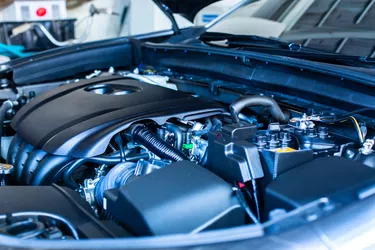
In many instances, you can sign over a check you receive from your insurance company to a body shop to pay for your repairs. Whether or not the repair shop will accept the check is another story. It might depend on how the insurance company issued the check, such as using a double payee, points out Rocco's Collision. Reviewing how to deal with this situation will help you get things settled sooner than later and get you back on the road.
What Does “Sign Over” Mean?
Video of the Day
When you receive a check made payable to you (or your business), you can deposit the check into your checking or savings account, cash the check or sign it over to another person or business. This latter option means that you change the payee on the check by signing the back (endorsing the check) and then changing the payee.
Video of the Day
You have now signed the check over to this new person or business. They will then have to endorse it and deposit or cash it or sign it over to someone else. The more times a check is signed over, the less likely a bank or check-cashing service will accept it without requiring the final holder to jump through a few hoops.
Signing Over Your Insurance Check
Let's say you make an insurance claim after an accident and receive $1,200 to make the repairs (based on the estimates you received). You can take the check to your bank, cash or deposit it and then pay the auto body shop with cash, a credit card or another check. If you don't have enough money in your bank to cover the check, you might have to wait several days for the insurance check to clear.
If you don't want to wait for the auto body shop to start work on your car, you can sign over the check directly to them. Because the check is issued by an insurance company and specifically for your claim, many auto body shops are likely to accept it and begin work even before they deposit the check.
To sign over a check, turn it over and write your signature in the endorsement area exactly as it appears on the front of the check. Under that, write, "Pay to" followed by the name of the body shop. The body shop will then endorse the check under that line (businesses often use an endorsement stamp).
Things to Watch For
In some cases, an insurance company will issue a check with two payees. For example, if you are not the lien holder (such as with a financed or leased car), the insurance company might make you and the lien holder the payees. Both of you have to endorse the check. This is done to make sure you let the lien holder know you have the money for the repairs. The lien holder might not endorse the check until they inspect the damage, investigate the repair shop you've chosen and approve the repairs.
If the amounts of the insurance check and the repairs are different, you'll need to decide how the difference will be addressed. For example, if the $1,200 insurance check doesn't cover all the work you're getting done (you might have asked for extra work unrelated to the claim), you'll have to pay the difference.
Be Careful Pocketing Money
Some people collude with body shops to give inflated repair estimates, pocketing the difference. If you own the car, you might not need all the repairs made. For example, you might be fine having the car made road worthy, but you don't need all the dents pounded out. In this situation, you can sign the $1,200 check over to the collision shop (which you've asked to make $800 worth of repairs) with the agreement that the shop will give you $400 in cash.
In other cases, the insurance company will make the check payable to you and the body shop, but you want to take the money instead of making the repairs. This is legal in many instance, according to Body Shop Business. Check with your insurance company any time you decide not to make all the repairs the company has approved and paid for. If you don't make the repairs, it could affect future claims or result in your policy getting cancelled.